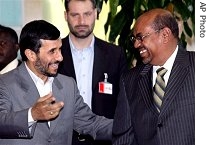2007年VOA标准英语-Iran, Sudan Hold Talks in Khartoum(在线收听)
Nairobi
28 February 2007
Iranian President Mahmoud Ahmadinejad is in Sudan for two days of meetings with his Sudanese counterpart and other officials. The talks are expected to cover the situation in Darfur, Iran's controversial nuclear program, and economic and cultural projects between the two countries. Cathy Majtenyi reports for VOA from Nairobi.
Ministry of Information advisor Rabie Abdul Atti tells VOA that discussions on Darfur and Iran's nuclear program are expected to top the agenda Mr. Ahmadinejad's visit.

Sudanese President Omar el-Bashir, right, chats with Mahmoud Ahmadinejad before their talks in Khartoum, 28 Feb 2007
Atti says Iran may also offer support to the cash strapped African Union troops who are in Darfur to monitor a ceasefire between the government and a rebel group.
"What will be discussed between the two presidents will be, I think, the help that Iran provides to Sudan - financial help - to ensure security and to resolve this crisis in Darfur, and to assist and support [the] Sudan government in the humanitarian issues: the return of the displaced to their villages, and also to establish security in the area that is witnessing conflicts between the rebels and the government," he said.
Regarding Iran's nuclear program, Atti says President Bashir will likely encourage his counterpart to pursue peaceful ends.
"I think the stance of Sudan regarding nuclear projects is very clear: that nuclear projects should be used only for peaceful means and not to be used for destructive weapons. I think that Sudan will boost Iran in this direction and not in the direction of making nuclear projects for manufacturing destructive weapons," he said.
Both Iran and Sudan are being heavily criticized by the United Nations Security Council and others in the West: Iran for its uranium enrichment program; and Sudan for its failure to stop the bloodshed in Darfur, which is considered one of the world's worst humanitarian crisis and one the United States has labeled genocide.
The U.N. Security Council is discussing expanding its sanctions on Iran for it's nuclear program.
Sudan has resisted efforts to allow a United Nations peacekeeping force to enter Darfur, where the four-year-old conflict has killed some 200,000 people and displaced more than two million, arguing that such a move would undermine Sudan's sovereignty.
Sudan is also resisting efforts by the International Criminal Court to find and prosecute people suspected of committing war crimes in the volatile area. The court named two suspects Tuesday, but the Sudanese government vowed not to hand them over.
The Iranian president is scheduled to be in Sudan for two days.
Ministry of Information advisor Atti says the two countries are expected to review past agreements and discuss new projects in the areas of agriculture, electricity, gas, and others.